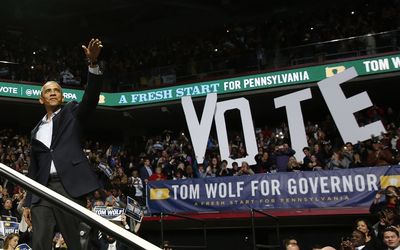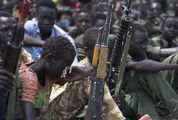AT FIRST blush, the vast Canton trade fair in Guangzhou, China, and the small Navarro College in Corsicana, Texas, have nothing in common. But with the spread of Ebola and global panic about its contagion, they are now joined together.
In both places, the collateral victims actually come from a country, Nigeria, recently certified as free of the disease.
The Financial Times reported that a Nigerian businessman, who had been trading in China for more than 40 years, was denied entry to the Canton trade fair, China’s largest, "because of fears that he was an Ebola carrier". Charles Aboir recounted how local police visited him regularly at his hotel and government doctors called to check his temperature every few days. "I keep telling them, Nigeria is Ebola-free," the cosmetics trader told the paper.
Thousands of kilometres away, Navarro College made it onto the oped pages of The New York Times with its decision to reject applicants for admission from Nigeria, stating that it "would not accept students from countries with Ebola cases". This led columnist Nicholas Kristof to observe that the decision was "a bit problematic because that would mean no longer accepting Americans".
Kristof concludes that the most alarming symptom of Ebola in the US is that "it seems to make brains mushy and hearts hard".
Although the most affected West African countries — Guinea, Sierra Leone and Liberia — have reported more than 14,000 cases of the virus, about 5,000 of them fatal, in the US, the confirmed Ebola victims number just seven, of whom one has died.
On the eve of last Tuesday’s US midterm elections, the most expensive (about $4bn was spent on them) and sour in US history, the Democratic front-runner for its 2016 presidential nomination, Hillary Clinton, told a campaign crowd in Kentucky that "Fear is the last resort of those who run out of hope". Given the resounding win there on Tuesday by Republican senator Mitch McConnell, likely to be the next Senate majority leader, it would seem that fear trumps hope, especially when a dread disease from faraway Africa can frame the narrative of White House incompetence and irresoluteness, which the Republicans hang on the head of now extremely unpopular President Barack Obama.
Actually, Ebola was a bipartisan affair in last week’s elections, leading CBS Evening News to conclude that "ad makers from both sides are hoping fear of Ebola is just as contagious as the disease itself, using body bags and hazmat suits to blame opponents for Ebola’s arrival in the US". So for every Republican attack on Obama’s handling of the disease, there were counterattacks from besieged Democrats. A liberal independent grouping (aligned to Democratic candidates) ran TV commercials featuring footage of Ebola victims and healthcare workers in protective garb with voice-overs of Republicans calling for budget cuts. The narrator’s tag-line warned, "Republican cuts kill". According to analysis, no fewer than 734 Ebola-themed campaign commercials were featured last month, up from 484 the month before. All, needless to say, were on the "panic-pandemic" theme and had nothing to do with funding or effective disease control.
When Obama’s ratings soared as the "Hope and Change" insurgent in the 2008 presidential election, in which he went from nowhere to win, there was a telling moment in the campaign later retold on Fox News. It concerned the debate preparation of Republican vice-presidential candidate Sarah Palin. It reported her as "not understanding that Africa was a continent rather than a country". To be fair, she later called this "a lie", but it goes to the general point of crude, uninformed and undifferentiated analysis.
Africa suffers not just from dread diseases that mutate and multiply and cause fear and provide campaign fodder far away, but also — to invoke a medical phrase — from the perils of "triage". This is the separation of medical hospital emergencies into groups for either immediate or later treatment. The narrative of "Hopeless Africa" of just more than a decade ago gave way for a while to the "Africa Rising" trope of more recent times and was finessed recently into the "Africa Watching" equivocation of International Monetary Fund boss Christine Lagarde.
Undoubtedly, Lagarde’s caution was influenced, in major part, by the subtext of her organisation’s October Regional Economic Outlook for Sub-Saharan Africa. Below the headline of "Robust Growth" for the region was the economic health warning: "The positive picture, however, coexists with the dire situation in Guinea, Liberia and Sierra Leone where beyond the unbearable number of deaths … the Ebola outbreak is exacting a heavy economic toll, with economic spillovers starting to materialise in some neighbouring countries."
Given the rapid mutation of the virus and its cross-border and cross-continental agility, the US Centers for Disease Control’s projection of more than 1-million infections within months in a "worst-case scenario" remains in play, unless a vaccine is found and more vigorous containment measures are taken.
Nothing demonstrates the shape-shifting narrative in the US and China better than to recall that it was as recently as August that dollars, not disease, formed the framing analysis for Africa. In Washington, DC, Obama hosted the first US-Africa Summit by the White House, attended by no fewer than 49 of 54 African Union (AU) heads of state and government. China has been hosting such summits for years. Indeed, many commentators saw the summit as the US catching up with China, whose $200bn African trade flows last year dwarf the US’s more modest $60bn. But in unveiling new private sector investments of $14bn at the summit, Obama underlined the point that, for Africa, a new page appeared to have turned.
Before the narrative changes again, and crippled though Obama was in last week’s elections, his essential analysis on Ebola and its wider reach is correct. He cited Ebola as "a global security threat…. Ebola anywhere is a threat to people everywhere." In committing 4,000 troops to fight it on the ground, the US has joined its long-standing foe, Cuba, which has sent 300 health workers to assist.
Our moral sensibilities might be affronted by the fact that when Ebola was contained for the past three decades in the remotest reaches of the Democratic Republic of Congo, no one in the wider world took much notice. Now its virulent spread proves late in the day that once remote problems in Africa can no longer be ring-fenced from the affluent world. In this case, self-interest is far better than global indifference.
Since 1994, SA’s failure to initially grasp the severity and treat scientifically the scourge of HIV/AIDS is a ruinous reminder of allowing politics to triumph over immunology. The fact that the health minister of the time, Dr Nkosazana Dlamini-Zuma, was in charge back then and today heads the AU might also explain its own lead-from-behind response to Ebola. Ironically, it was only the ascent to the presidency here in 2009 of her former husband, Jacob Zuma, that resulted in medical science, not ideology, informing the local HIV/AIDS response.
But even in the US, political impulses — from the forced quarantine of health workers to proposed blanket travel bans — which overwhelm the clear and present danger of the spread of Ebola, prove something else that is sadly universal: sensible science is often wrong-footed by stupid politics. Let’s hope that, in the case of Ebola, the former prevails over the latter in time.

Barack Obama. Picture: REUTERS/LARRY DOWNING
AT FIRST blush, the vast Canton trade fair in Guangzhou, China, and the small Navarro College in Corsicana, Texas, have nothing in common. But with the spread of Ebola and global panic about its contagion, they are now joined together.
In both places, the collateral victims actually come from a country, Nigeria, recently certified as free of the disease.
The Financial Times reported that a Nigerian businessman, who had been trading in China for more than 40 years, was denied entry to the Canton trade fair, China’s largest, "because of fears that he was an Ebola carrier". Charles Aboir recounted how local police visited him regularly at his hotel and government doctors called to check his temperature every few days. "I keep telling them, Nigeria is Ebola-free," the cosmetics trader told the paper.
Thousands of kilometres away, Navarro College made it onto the oped pages of The New York Times with its decision to reject applicants for admission from Nigeria, stating that it "would not accept students from countries with Ebola cases". This led columnist Nicholas Kristof to observe that the decision was "a bit problematic because that would mean no longer accepting Americans".
Kristof concludes that the most alarming symptom of Ebola in the US is that "it seems to make brains mushy and hearts hard".
Although the most affected West African countries — Guinea, Sierra Leone and Liberia — have reported more than 14,000 cases of the virus, about 5,000 of them fatal, in the US, the confirmed Ebola victims number just seven, of whom one has died.
On the eve of last Tuesday’s US midterm elections, the most expensive (about $4bn was spent on them) and sour in US history, the Democratic front-runner for its 2016 presidential nomination, Hillary Clinton, told a campaign crowd in Kentucky that "Fear is the last resort of those who run out of hope". Given the resounding win there on Tuesday by Republican senator Mitch McConnell, likely to be the next Senate majority leader, it would seem that fear trumps hope, especially when a dread disease from faraway Africa can frame the narrative of White House incompetence and irresoluteness, which the Republicans hang on the head of now extremely unpopular President Barack Obama.
Actually, Ebola was a bipartisan affair in last week’s elections, leading CBS Evening News to conclude that "ad makers from both sides are hoping fear of Ebola is just as contagious as the disease itself, using body bags and hazmat suits to blame opponents for Ebola’s arrival in the US". So for every Republican attack on Obama’s handling of the disease, there were counterattacks from besieged Democrats. A liberal independent grouping (aligned to Democratic candidates) ran TV commercials featuring footage of Ebola victims and healthcare workers in protective garb with voice-overs of Republicans calling for budget cuts. The narrator’s tag-line warned, "Republican cuts kill". According to analysis, no fewer than 734 Ebola-themed campaign commercials were featured last month, up from 484 the month before. All, needless to say, were on the "panic-pandemic" theme and had nothing to do with funding or effective disease control.
When Obama’s ratings soared as the "Hope and Change" insurgent in the 2008 presidential election, in which he went from nowhere to win, there was a telling moment in the campaign later retold on Fox News. It concerned the debate preparation of Republican vice-presidential candidate Sarah Palin. It reported her as "not understanding that Africa was a continent rather than a country". To be fair, she later called this "a lie", but it goes to the general point of crude, uninformed and undifferentiated analysis.
Africa suffers not just from dread diseases that mutate and multiply and cause fear and provide campaign fodder far away, but also — to invoke a medical phrase — from the perils of "triage". This is the separation of medical hospital emergencies into groups for either immediate or later treatment. The narrative of "Hopeless Africa" of just more than a decade ago gave way for a while to the "Africa Rising" trope of more recent times and was finessed recently into the "Africa Watching" equivocation of International Monetary Fund boss Christine Lagarde.
Undoubtedly, Lagarde’s caution was influenced, in major part, by the subtext of her organisation’s October Regional Economic Outlook for Sub-Saharan Africa. Below the headline of "Robust Growth" for the region was the economic health warning: "The positive picture, however, coexists with the dire situation in Guinea, Liberia and Sierra Leone where beyond the unbearable number of deaths … the Ebola outbreak is exacting a heavy economic toll, with economic spillovers starting to materialise in some neighbouring countries."
Given the rapid mutation of the virus and its cross-border and cross-continental agility, the US Centers for Disease Control’s projection of more than 1-million infections within months in a "worst-case scenario" remains in play, unless a vaccine is found and more vigorous containment measures are taken.
Nothing demonstrates the shape-shifting narrative in the US and China better than to recall that it was as recently as August that dollars, not disease, formed the framing analysis for Africa. In Washington, DC, Obama hosted the first US-Africa Summit by the White House, attended by no fewer than 49 of 54 African Union (AU) heads of state and government. China has been hosting such summits for years. Indeed, many commentators saw the summit as the US catching up with China, whose $200bn African trade flows last year dwarf the US’s more modest $60bn. But in unveiling new private sector investments of $14bn at the summit, Obama underlined the point that, for Africa, a new page appeared to have turned.
Before the narrative changes again, and crippled though Obama was in last week’s elections, his essential analysis on Ebola and its wider reach is correct. He cited Ebola as "a global security threat…. Ebola anywhere is a threat to people everywhere." In committing 4,000 troops to fight it on the ground, the US has joined its long-standing foe, Cuba, which has sent 300 health workers to assist.
Our moral sensibilities might be affronted by the fact that when Ebola was contained for the past three decades in the remotest reaches of the Democratic Republic of Congo, no one in the wider world took much notice. Now its virulent spread proves late in the day that once remote problems in Africa can no longer be ring-fenced from the affluent world. In this case, self-interest is far better than global indifference.
Since 1994, SA’s failure to initially grasp the severity and treat scientifically the scourge of HIV/AIDS is a ruinous reminder of allowing politics to triumph over immunology. The fact that the health minister of the time, Dr Nkosazana Dlamini-Zuma, was in charge back then and today heads the AU might also explain its own lead-from-behind response to Ebola. Ironically, it was only the ascent to the presidency here in 2009 of her former husband, Jacob Zuma, that resulted in medical science, not ideology, informing the local HIV/AIDS response.
But even in the US, political impulses — from the forced quarantine of health workers to proposed blanket travel bans — which overwhelm the clear and present danger of the spread of Ebola, prove something else that is sadly universal: sensible science is often wrong-footed by stupid politics. Let’s hope that, in the case of Ebola, the former prevails over the latter in time.






















Post a comment